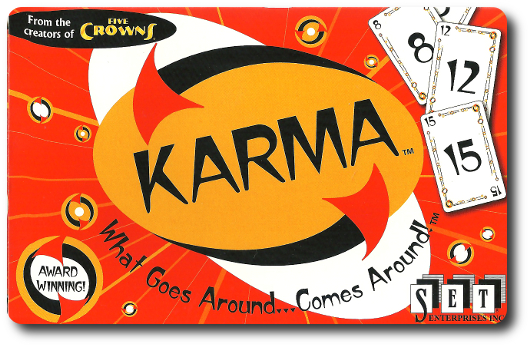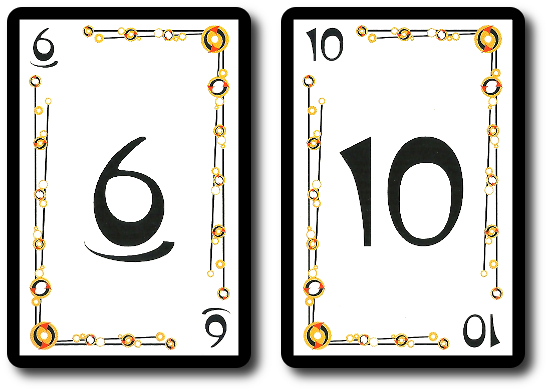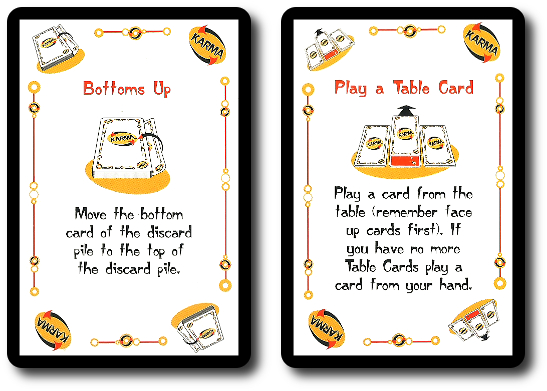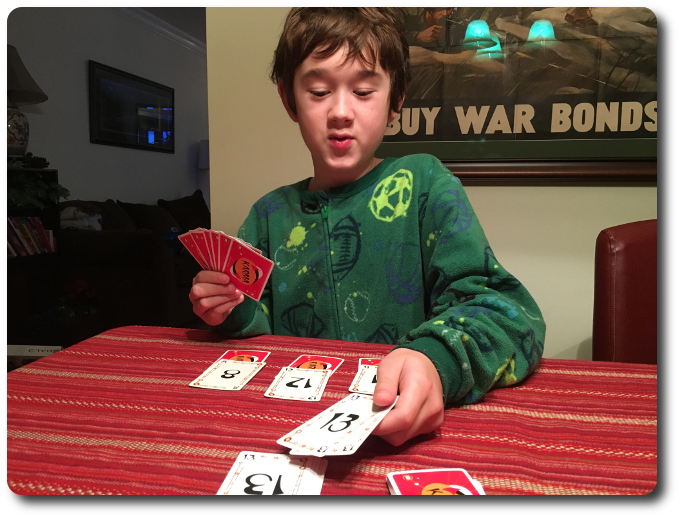
The Basics:
- For ages 8 and up
- For 2 to 6 players
- Approximately 40 minutes to complete
Geek Skills:
- Counting & Math
- Logical & Critical Decision Making
- Reading
- Hand/Resource Management
Learning Curve:
- Child – Easy
- Adult – Easy
Theme & Narrative:
- None
Endorsements:
- Gamer Geek rejected!
- Parent Geek mixed!
- Child Geek approved!
Overview
American film actor, director, and producer, John Wayne, said “Life is tough. It’s tougher if you’re stupid.” I believe this quote perfectly captures the essence of Karma. If we walk through life with thoughtful purpose and measured actions, we tend to succeed. If we rush ahead without thinking and give little count to those around us, failure in all things is almost certain. In this game, what you play will return to you for better or for worse.
Karma, designed by Marsha J. Falco and published by Set Enterprises, is comprised of 60 cards. The cards are as thick and as durable as your standard playing card.
What Goes Around Comes Around
To set up the game, first shuffle the cards and then deal 3 face-down to each player. These should be arranged in a row in front of their owning player. None of these cards should be looked at.
Second, deal 6 cards to each player. Players pick up these cards and decide which 3 to keep in their hand and which 3 to play face-up and on top of the 3 face-down cards, one face-up card per face-down card.
That’s it for game set up. Place the remaining deck of cards in the middle of the playing area. This is the draw deck for the duration of the game.
You Get What You Give
Karma is played in turns with no set number of turns per game. The player left of the Dealer starts the game. A player’s turn is summarized here.
Step 1: Play Cards
On their turn, the player can take cards from their hand and play them to the discard pile. If this is the first play of the game, any card from the player’s hand will do. For all future turns, the card played must have a number value equal to or higher than the previously played card in the discard pile. Only 1 card can be played from the player’s hand per turn unless they have 2 or more cards with the same value. If such is the case, they can play the matching cards at one time. However, the card values must be equal to or higher than the previously played card in the discard pile.

If a player is unable to or decides not to play a card from their hand, they must take all the cards currently in the discard pile and add it to their hand. The player’s turn is over and the next player in turn order sequence starts a new discard pile.
Step 2: Draw Cards
If the player did play a card or cards to the discard pile, they draw cards from the draw deck until their hand size is back up to 3 cards. If the player already has 3 (or more) cards in their hand, they do not draw any cards. If the draw deck is exhausted, the player does not draw any cards.
This ends the player’s turn. The next player in turn order sequence now goes.
The Table Cards
All players start the game with 6 table cards. Three are facing up and three are facing down. These cards cannot be played to the discard pile until the player removes all the cards from their hand. Then, only the face-up table cards can be played. It’s only after all the hand cards and face-up table cards have been played that a player can play their face-down table cards. However, these cards remain face-down until played, meaning a player might blindly draw a card that does not work (not equal to or higher than current discard card value or is not a Karma card) and must take the discard pile and the now revealed face-down card into their hand.
If the player ever has cards back in their hand, they must get ride of them before they can once again use the table cards.
The Rule of Triples
Two cards of the same value can be played from a player’s hand or from the table cards (never both) to a discard pile. If the discard pile ever has 3 cards in a row with the same value, the discard pile is removed from the game and the same player takes another turn.
The Karma Cards
Karma cards are considered “Wild” and can be played on top of any other card. This includes any number value or other Karma card. Once played to the discard pile, the Karma card is resolved. The different Karma card effects are summarized here.
- “Give the Pile to a Friend” – Play and give the entire discard pile to any other opponent, including opponents that have played all their cards. The Karma card is removed from the game.
- “Play a Table Card” – Play to the discard pile and then play your table cards as if you had no cards in your hand.
- “Bottoms Up” – Play to the discard pile and then take the card on the bottom of the discard pile and place it on top.
- “Five or Below” – Play to the discard pile to force the next opponent to play a card with a value of “5” or lower (or a Karma card).

Winning the Game
A player wins the game if they are not the last one with cards still to be played. This means a game of 4 players will technically have 3 winners.
Game Variant
This game variant removes the “Give the Pile to a Friend” Karma cards from the game prior to dealing cards. When a player makes a triple using numbers in the discard pile, they take the 3 matching numbers and remove them from play. They then give the rest of the discard pile to any other opponent of their choice. This includes opponents that have already played all their cards.
To learn more about Karma, visit the game’s web page.
Final Word
The Gamer Geeks have played card games in the past where the purpose was to play cards as fast as possible. They had no problem learning how to play Karma and getting right into the action. They were disappointed when they had to take all of the discarded cards into their hand and elated when they forced an opponent to do the same. According to one Child Geek, “The best thing you can do is just play all your cards as fast as possible and save the Karma cards for perfect moments.” Another Child Geek said, “The game is a bit slower than I thought it would be and I hate getting more cards when I’m out, but I had fun!” When all the cards were back in the box, the Child Geeks gave Karma their approval.

My oldest son rejoices in playing the difficult Triple!
The Parent Geeks were a slightly different story. While all of the Parent Geeks found Karma to be a game that was easy to learn and to teach, a number of the Parent Geeks found the game play to be too repetitive to be of real interest. According to one Parent Geek, “I find the game to be monotonous more times than not. The only thing that keeps it interesting is the occasional Karma card play.” But the supposed repetitious nature of the game was exactly what other Parent Geeks enjoyed. According to one such Parent Geek, “I like how you have to constantly duck and dodge, play just the right card, or suffer the consequences. I think this game is a lot of fun.” The final vote from the Parent Geeks revealed that roughly half enjoyed Karma while the other half did not.
If the Parent Geeks were of two different minds, the Gamer Geeks were collectively on the same page. All of the Gamer Geeks found Karma to be a card game that was not worth their time. According to one Gamer Geek, “This game feels a bit too close to War and is too simple. The only thing a player needs to think about is what card to play and even that decision is made simple because players always have to play a certain number or higher.” The Gamer Geeks did acknowledge that the Karma cards did add a bit of flavor to a game they otherwise found bland, but not nearly enough to make it a game they wanted to play. As one Gamer Geek put it, “This is a great card game for families or very casual card players. And that’s about it.” The Gamer Geeks rejected Karma.
You have to think when you play Karma, but not much. As one Gamer Geek already suggested, the cards to be played are pretty obvious. You either play a card that is equal to or higher than the current card value on the discard pile or a Karma card. The only thinking you have to do is consider which card value to play. This is the real “gotcha” of the game, as a player never wants to be stuck with low cards. Yet, if the player plays a high valued card, they might be able to skunk an opponent and force them to take the discard pile.
It sounds like a little thing, but the decision is an important one. This is especially true when players have to use their face-down cards. I personally found this to be an interesting way to play the game and also very annoying. Throughout the entire game players can see their cards and make decisions. Then, at the very end when victory is in sight, the game throws three speed bumps to slow everything down. It creates a bit of tension, to be sure, but it also generated resentment towards the game.
I found Karma to be a game I could easily play with my children and their friends, but not a game I particularly enjoyed playing with adults. The game lacks depth, but it does give its players some room to maneuver. I would suggest Karma to families who are looking to play a card game or for groups of Child Geeks. Don’t expect your good deeds to go rewarded in this game, as the only Karma you will generate is the kind that results in passive aggressive card plays.
This game was given to Father Geek as a review copy. Father Geek was not paid, bribed, wined, dined, or threatened in vain hopes of influencing this review. Such is the statuesque and legendary integrity of Father Geek.

